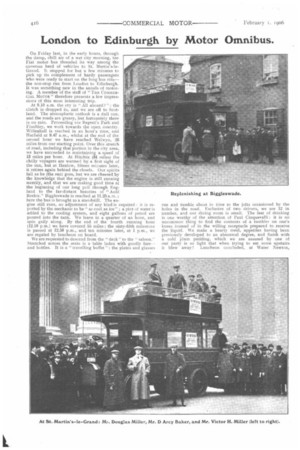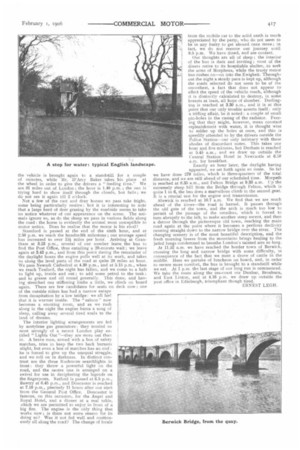London to Edinburgh by Motor Omnibus.
Page 12

Page 13

If you've noticed an error in this article please click here to report it so we can fix it.
On Friday last, in the early hours, through the damp, chill air of a wet city morning, toe Fiat motor bus threaded its way among the common herd of vehicles to St. Martin's-le. Grand. It stopped for but a few minutes to pick up its complement of hardy passengers who were ready to start on the long bus ride— the non-stop run from London to Edinburgh. It was something new in the annals of motoring. A member of the staff of " THE COMME12.ciAL MOTOR" therefore presents a few impressions of this most interesting trip.
At 8.10 a.m, the cry is "All aboard?" : the clutch is dropped in, and we are off to Scotland. The atmospheric outlook is a dull one, and the roads are greasy, but fortunately there is no rain. Proceeding via Regent's Park and Finchley, we work towards the open country. Willenhall is reached in an hour's time, and Hatfield at 9.47 a.m., whilst at the end of the second hour we have reached Welwyn, 26 miles from our starting point. Over this stretch of road, including that portion in the city area, we have succeeded in maintaining a. speed of 13 miles per hour. At Hitchin (34 miles) the chilly voyagers are warmed by a first sight of the sun, but at Nenlow, fifteen minutes later, it retires again behind the clouds. Our spirits fall as he (the sun) goes, hut we are cheered by the knowledge that the engine is still running merrily, and that we are making good time at the beginning of our long pull through England to the far-distant beauties of " Auld Reekie." Biggleswade is reached at 11.25 a.m. ; here the bus is brought to a standstill. The engine still runs, no adjustment of any kind is required : it is reported by the mechanic to be "as cool as ice" ; a pint of water is added to the cooling system, and eight gallons of petrol are poured into the tank. We leave in a quarter of an hour, and spin gaily along. By the end of the fourth running hour (12.10 p.m.) we have covered 55 miles 3 the sixty-fifth milestone is passed at 12.50 p.m., and ten minutes later, at 1 p.m., we are regaled by luncheon on board.
We are requested to descend from the " deck " to the "saloon." Stretched across the seats is a table laden with goodly fareand bottles. It is a "travelling buffet ; the plates and glasses
run and tumble about in time to the jolts occasioned by the holes in the road. Exclusive of two drivers, we are 12 in number, and our dining room is small. The feat of drinking is one worthy of the attention of Paul Cinquevalli : it is no uncommon thing to find the contents of a tumbler on one's knees instead of in the willing receptacle prepared to receive the liquid. We make a hearty meal, appetites having been previously developed to an abnormal degree, and finish with a cold plum pudding, which we are assured by one of our party is so light that when trying to eat some upstairs it blew away ! Luncheon concluded, at Water Newton,
the vehicle is brought again to a standstill for a couple of minutes, while Mr. D'Arcy Baker takes his place at the wheel in order to give the drivers a "feeding time." We are 81 miles out of London ; the hour is 1.40 p.m. ; the sun is trying hard to show itself through the clouds, but fails ; we do not see it again till 2 o'clock. Not a few of the cart and dray horses we pass take fright. some being particularly restive ; but it is interesting to note that a large herd of deer grazing by the roadside seems to take no notice whatever of our appearance on the scene. The animals ignore us, as do the sheep we pass in various fields along the road: the horse is evidently the animal most susceptible to motor antics, Does he realise that the motor is his rival?
Stamford is passed at the end of the sixth hour, and at 2.50 p.m. we reach the hundredth milestone ; our average speed has increased to over 151 miles per hour. Arriving at Grantham at 3.23 p.m., several of our number leave the bus to find the Post Office, thus entailing a 20-minute wait ; we leave again at 3.43 p.m., and from this point during the remainder of the daylight hours the engine pulls well at its work, and takes us along the level parts of the road at quite 20 miles an hour. We pass Newark Cathedral at 4.30 p.m., and at 5.15 p.m., when we reach Tuxford, the night has fallen, and we come to a halt to light up, inside and out ; to add some petrol to the tank: and to grease and oil round generally. This done, and having stretched our stiffening limbs a little, we climb on board again. There are few candidates for seats on deck now ; one of the outside riders has had a narrow escape from decapitation by a low bridge: we all feel that it is warmer inside. The "saloon" now becomes a smoking room, and as we rush along in the night the engine hums a song of sleep, calling away several tired souls to the land of dreams.
The interior lighting arrangements are fed by acetylene gas generators : they remind us most strongly of a recent London play entitled "Lights Out "—they are more out than in. A brave man, armed with a box of safety matches, tries to keep the two back burners alight, but even a box of matches has an end : he is forced to give up the unequal struggle, and we roll on in darkness. In distinct contrast are the three Rushmore searchlights in front : they throw a powerful light on the road, and the centre one is arranged on a swivel for use in deciphering the legends on the fingerposts. Retford is passed at 6.5 p.m., Bavrtry at 6.45 p.m., and Doncaster is reached at 7.10 p.m., precisely 11 hours after our start from the General Post Office. Doncaster is famous, on this occasion, for the Angel and Royal Hotel, and a dinner at a real table, .vhich we are permitted to enjoy in front of a big fire. The engine is the only thing that works now ; is there not some reason for its doing so? Was it not fed well and continuously all along the road? The change of locale from the mobile car to the solid earth is much appreciated by the party, who do not seem to be in any hurry to get aboard once more; in fact, we do not resume our journey until 11.5 p.m. We have dined, and are content.
Our thoughts are all of sleep: the interior of the bus is dark and inviting ; most of the diners retire to its hospitable shelter, to seek the arms of Morpheus, while the trusty motor bus rushes on—on into the Ewigkeit. Throughout the night a steady pace is kept up, although the roads selected do not seem to be of the smoothest, a fact that does not appear to affect the speed of the vehicle much, although it is distinctly calculated to destroy, in some breasts at least, all hope of slumber. Darlington is reached at 3.30 a.m., and it is at this point that our only trouble asserts itself : only a trifling affair, be it noted: a couple of small pin-holes in the casing of the radiator. Fearing that they might, however, mean constant replenishment with water, it is thought wise to solder up the holes at once., and this is speedily attended to by the drivers outside the Police Station—our only intimacy with these abodes of discordant notes. This takes one hour and five minutes, but Durham is reached at 5.45 a.m., and we draw up outside the Central Station Hotel in Newcastle at 6.50
a.m. for breakfast.
Exactly an hour later, the daylight having appeared, we set forth again en route. So far we have done 279 miles, which is three-quarters of the total distance, and we are still ahead of our scheduled time. Morpeth is reached at 8.35 a.m., and Felton Bridge at 9.33 a.m. rp the extremely steep hill from the Bridge through Felton, which is quite 1 in 6, the bus does a marvellous climb in the second gear. It is a crucial test for the engine and transmission.
Alnwick is reached at 10.7 a.m. We find that we are much ahead of the times—the road is barred. It passes through the old gate of the town, and the arch is much too low to permit of the passage of the omnibus, which is forced to turn abruptly to the left, to make another steep ascent, and then a detour through the picturesque old town, reaching the main road again at the point where it becomes a perilous declivity running straight down to the narrow bridge over the river. The changing scenery is of the most beautiful description, and the fresh morning breeze from the mountains brings healing to the jaded lungs condemned to breathe London's tainted airs so long. At 11.52 a.m. we have reached the border town of Berwick, crossing the long and narrow bridge with some difficulty, in consequence of the fact that we meet a drove of cattle in the middle. Here we partake of luncheon on board, and, in order to secure more comfort, the bus is brought to a standstill while we eat. At 1 p.m. the last stage of our long run is commenced. We take the route along the sea-coast via Dunbar, Broxburn, and East Linton, and at 4.16 p.m. we draw up outside the post office in Edinburgh, triumphant though tired. ERNEST LEGH.




















